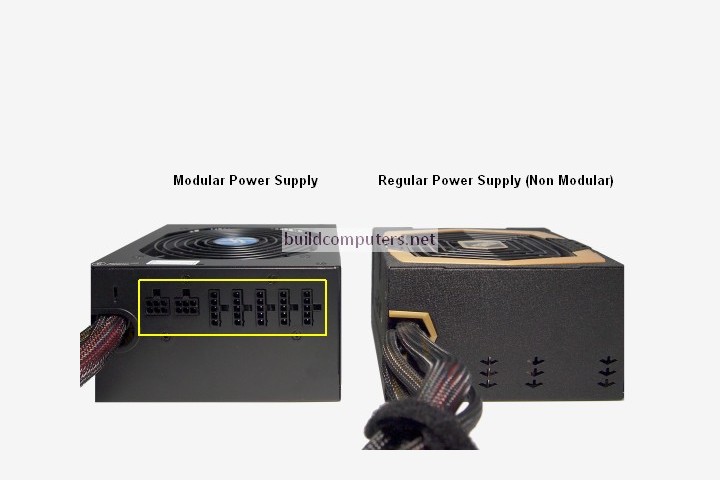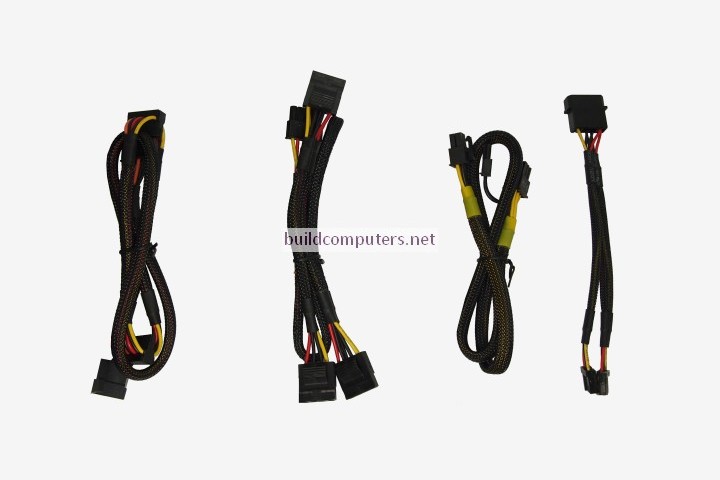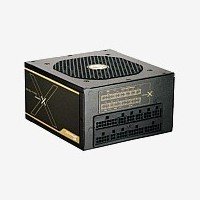Should You Buy a Modular PSU?
What is the difference between a modular PSU vs regular PSU? Find out whether you should be buying a modular power supply or not.
Until a few years ago, most consumers paid little or no attention to their computer power supplies - They would splurge on a bleeding edge CPU and monster graphics card, only to cheap out on a inferior power supply unit.
Nowadays people are finally realizing that a reliable power supply is the most critical component of a computer, and this has led to the growing popularity of power supplies with high efficiencies (see our "Should You Buy a 80 Plus Power Supply" article) and modular designs.
What is a modular power supply unit? In simple terms, it is a power supply where some or all of its cables and connectors are detachable; This is different from a regular power supply where all its cables are permanently fused to the unit.
In the image below, you can see the difference between a modular and non modular PSU. The sockets for the detachable power cables are boxed in yellow:

Advantages of a Modular Power Supply Unit
Recommended Power Supplies
Budget Computer:
EVGA 500 BR 80+ Bronze 500W
Mid Range Computer:
Cooler Master MWE 550 Gold 550W
Gaming Computer:
Corsair RM850x 80+ Gold 850W
Home Theater PC:
Seasonic Focus SGX-500 80+ Gold 500W
Click here for our buyer's guide to the best computer power supplies.
1. Better Cable Management
Power supply cables take up the bulk of space inside a computer case.
Unless your computer has 12 hard drives, 10 case fans and quad graphics
cards, you won't be needing all of these cables.
By detaching
unused power cables from a modular power supply, you will typically end
up having three to four less cables within your computer case. That's at least
1.5 meters (5 feet) less cables snaking inside your case and hiding in
your drive bays. Having less cables to grapple with also makes cable
management easier, saving you time and effort.
If cable
management is a priority for you, then a modular PSU is worth it. Unless
you have a high end case with superb cable management features, buying a
modular power supply is the easiest method of achieving a neat and
atheistically-pleasing computer interior.
To illustrate this point, the image below shows the excess modular power cables left over after installing a power supply:

2. Lower Temperature
With less power cables and connectors collecting dust and clogging up the insides of your computer, the air flow inside your computer case is going to improve. This will in turn lower the operating temperatures of your internal components, allowing them to last longer and overclock better.
3. Space Saving
A modular power supply is a godsend for those working with small form
factor cases (e.g. Mini-ITX cases). In addition to their obvious space
constraints, miniature cases tend to have very limited cable management
features as well (e.g. no specialized spaces, gaps and holders to route
and hide cables).
Since everything in a small form factor case is
packed so close together, you can even swap out your standard length
(~60 cm) power cables with shorter ones (~35 cm). This frees up even more space within your computer case.
4. Easy PSU Removal
This is a point that you rarely see people bring up, but it's certainly
worth mentioning. Whether you're replacing a faulty power supply
or removing it for routine cleaning, uninstalling a modular PSU is a breeze -
You just have to detach the power connectors from the unit and unscrew
it from the computer case. The power cables will still be connected to the different components.
To remove a regular power supply unit, you will
have unplug the power connectors from all internal components
(motherboard, hard drives, optical drives, graphic cards, case fans
etc.). In the process, you'll also undo any cable
management that you may have painstakingly set in place.
Disadvantages of Modular Power Supplies
1. Higher Price
Modular vs non modular PSU price: All things being equal (same brand, same wattage, same efficiency, same form factor), a modular supply will cost 10 to 20% more than a regular power supply. Fully modular power supplies command slightly higher prices than semi modular ones.
2. Reliability and Efficiency
In theory, using detachable power connectors (vs hard wired connectors
for regular power supplies) will increase electrical resistance and
therefore lower the efficiency of modular power supplies.
The
connecting ends of a modular power cable may also be defective or loose,
causing damage to the power supply and other components connected to
it.
It was reported by TomsHardware
back in 2009 that even top tier PSU manufacturers such as Corsair, Enermax and
Seasonic advised customers to go for regular power supplies
if they wanted maximum efficiency. It has to be mentioned that those
were considered early years for modular power supplies and their
manufacturing processes have since improved.
In real world usage, most computer enthusiasts and hardware reviewers agree that there is little negligible power loss between a modular and non modular PSU. What matters most is that you choose a high quality power supply from a reputable manufacturer (be it modular or non modular). - Click here to see which power supplies we recommend for different types of computers.
SEE ALSO: What is a Modular Power Supply
POWER SUPPLY GUIDE
- Introduction to Power Supplies for Computers
- Recommended Computer Power Supplies
- Desktop PC Power Requirements
- Power Consumption of PC Components
- Should You Buy a 80 Plus Power Supply?
- What is a Modular Power Supply?
- Should You Buy a Regular or Modular PSU?
- How to Install a Power Supply Unit
- How to Connect Power Supply Connectors

